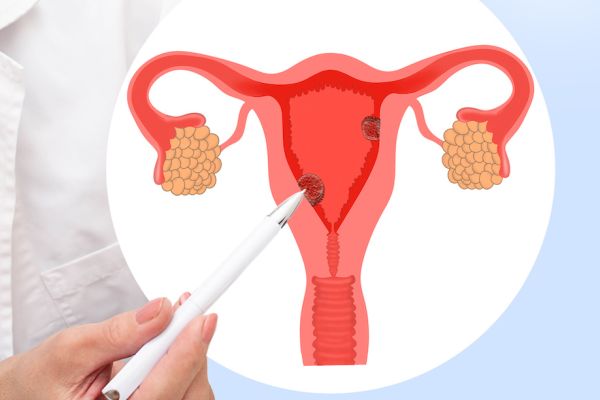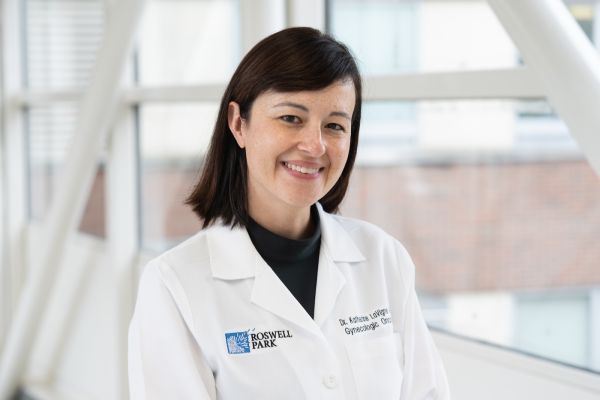What you should learn about their experience, fertility-sparing procedures they offer and more — before deciding where to seek cancer care.
If you’ve been diagnosed with uterine or endometrial cancer, surgery will likely be a primary part of your treatment. You’ll want to choose a surgeon and cancer center with the tools and expertise to deliver the best outcomes for your survival — and your quality of life for years to come. Gynecologic oncologist Peter Frederick, MD, FACOG, of Roswell Park Comprehensive Cancer Center explains the key points to discuss with a surgeon before deciding where to have your cancer treatment.
Are you a gynecologic oncologist?
The gold-standard treatment for cancer in the uterus is a hysterectomy which is surgery to remove the uterus. “While all gynecologists are qualified to perform a hysterectomy, when cancer is involved, your surgery can become more complex, and possibly involve other organs, structures and lymph nodes,” says Dr. Frederick. “You want a gynecologic oncologist, a gynecologist with extra specialty training and focused experience in treating cancer, specifically cancers of the female reproductive system.”
How many of these surgeries have you done?
Experience from performing a high volume of these complex operations matters, and the correlation between the number of surgeries performed and the quality of care is well documented. A typical gynecologist may perform a wide variety of operations for many diseases and conditions — but fewer cancers. At Roswell Park, our gynecologic oncologists focus on cancer.
You want a surgeon with a proven track record and a treatment center with a significant volume of procedures, but what does that mean? For uterine cancer, it means a center that performs 80 of these operations a year. Roswell Park averages more than 120 robotic hysterectomies per year for uterine cancer, as well as many robotic hysterectomies for precancerous and complicated benign conditions of the uterus.
In addition, high-volume experience in performing these operations with minimally invasive techniques, such as robotic surgery, is key. “It results in fewer complications and better outcomes as well as less pain and faster recovery. Roswell Park was the first in the region to offer robotic surgery decades ago and we have been surgical pioneers from the beginning. Our experience and expertise in robotic surgery allows us to safely offer a minimally invasive approach for a large number of patients and conditions,” says Dr. Frederick.
Roswell Park has been rated a High Performing Hospital for Gynecological Cancer Surgery by U.S. News & World Report. This designation, based on patient outcomes, patient volumes, cancer center designation and more, for both uterine and ovarian cancer, means Roswell Park is significantly better than the national average in key performance areas.
You have time for a second opinion
A second opinion from a team of uterine cancer experts is the best way to ensure that your initial diagnosis is accurate, that the recommended treatment strategy is right for you,
Can I preserve my fertility?
While a hysterectomy is the gold standard treatment for uterine cancer, younger women and those who have not completed their expected childbearing years understandably are concerned about losing their uterus. “Certain patients with low-risk cancers may be able to pursue a different treatment approach first — with hormonal therapy that preserves the uterus and maintains fertility. This approach requires close surveillance in carefully selected patients,” says Dr. Frederick.
“The decision of whether a woman can safely undergo that treatment plan is made by a team of experts from different medical specialties, including gynecologic oncology, radiology, pathology and others.
“At Roswell Park, we partner with fertility experts to counsel women about their chances for a healthy pregnancy, and their options, which may include IVF, egg harvesting, embryo freezing, and the fertility implications of delaying a hysterectomy.”
What advanced testing do you do on uterine tumors?
“We test all uterine cancers for a DNA error called mismatch repair or MMR which can indicate that the patient’s cancer may be related to a genetic condition that increases their cancer risk, not just for uterine cancer, but for other cancers including colorectal and ovarian cancers, too. A mismatch repair deficiency may indicate the need for genetic testing, guide the use of immunotherapy, and predict prognosis."
What side effects might occur from a hysterectomy?
While hysterectomy is the second-most common surgery for women (after cesarean section), it is major surgery and removing the uterus means that women enter menopause if they haven’t already. Removing the uterus when cancer is present may result in significant improvements in quality of life, such as a resolution of abnormal bleeding or less pelvic discomfort. When the ovaries are removed along with the uterus before menopause, symptoms such as changing body image, vaginal dryness and issues that may impact intimacy may occur. Roswell Park’s Sexual Health Clinic focuses on solutions that can help you regain a healthy sexual life.




